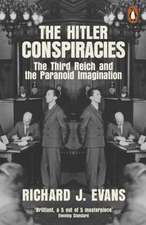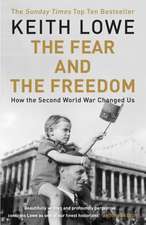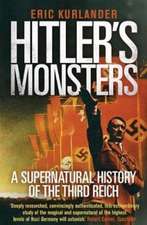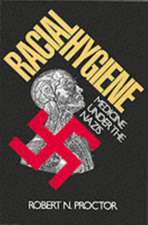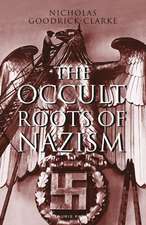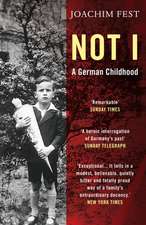The Coming of the Third Reich
Sean Pratt Autor Richard J. Evansen Limba Engleză CD-Audio – 23 mai 2016 – vârsta de la 18 ani
| Toate formatele și edițiile | Preț | Express |
|---|---|---|
| Paperback (2) | 92.47 lei 23-34 zile | +35.90 lei 6-10 zile |
| Penguin Books – 4 aug 2004 | 92.47 lei 23-34 zile | +35.90 lei 6-10 zile |
| Penguin Books – 31 dec 2004 | 133.25 lei 3-5 săpt. |
Preț: 376.99 lei
Nou
Puncte Express: 565
Preț estimativ în valută:
63.65€ • 69.36$ • 53.63£
63.65€ • 69.36$ • 53.63£
Indisponibil temporar
Doresc să fiu notificat când acest titlu va fi disponibil:
Se trimite...
Preluare comenzi: 021 569.72.76
Specificații
Notă biografică
Richard J. Evans was born in London and educated at Oxford University. He has taught at Columbia University and Birkbeck, University of London, and since 2014 has been the Regius Professor Emeritus of History at the University of Cambridge. His many publications include an acclaimed three-volume history of the Third Reich and a recent collection of essays, The Third Reich in History and Memory. A Fellow of the British Academy and the Royal Society of Literature, he is a past winner of the Wolfson History Prize, and was twice a History Honoree at the Los Angeles Times Book Awards. In 2012 he was appointed Knight Bachelor in the Queen's Birthday Honors List, for services to scholarship.
Cuprins
List of Illustrations
List of Maps and Diagrams
Preface
1. The Legacy of the Past
German Peculiarities
Gospels of Hate
The Spirit of 1914
Descent Into Chaos
2. The Failure of Democracy
The Weaknesses of Weimar
The Great Inflation
Culture Wars
The Fit and the Unfit
3. The Rise of Nazism
Bohemian Revolutionaries
The Beer-Hall Purtsch
Rebuilding the Movement
The Roots of Commitment
4. Towards the Seizure of Power
The Great Depression
The Crisis of Democracy
The Victory of Violence
Fateful Decisions
5. Creating The Third Reich
The Terror Begins
Fire in the Reichstag
Democracy Destroyed
Bringing Germany Into Line
6. Hitler's Cultural Revolution
Discordant Notes
The Purge of the Arts
'Against the Un-German Spirit'
A 'Revolution of Destruction'?
Notes
Bibliography
Index
List of Maps and Diagrams
Preface
1. The Legacy of the Past
German Peculiarities
Gospels of Hate
The Spirit of 1914
Descent Into Chaos
2. The Failure of Democracy
The Weaknesses of Weimar
The Great Inflation
Culture Wars
The Fit and the Unfit
3. The Rise of Nazism
Bohemian Revolutionaries
The Beer-Hall Purtsch
Rebuilding the Movement
The Roots of Commitment
4. Towards the Seizure of Power
The Great Depression
The Crisis of Democracy
The Victory of Violence
Fateful Decisions
5. Creating The Third Reich
The Terror Begins
Fire in the Reichstag
Democracy Destroyed
Bringing Germany Into Line
6. Hitler's Cultural Revolution
Discordant Notes
The Purge of the Arts
'Against the Un-German Spirit'
A 'Revolution of Destruction'?
Notes
Bibliography
Index
Recenzii
"Richard J. Evans's The Coming of the Third Reich...gives the clearest and most gripping account I've read of German life before aznd during the rise of the Nazis."—A. S Byatt, in the Times Literary Supplement
"Richard J. Evans's The Coming of the Third Reich is an enormous work of synthesis—knowledgable and reliable..."—Mark Mazower in the New York Times Book Review
"[A] first-rate narrative history that informs and educates and may inspire readers to delve even deeper into the subject."—Booklist
“…Brilliant…”ߝWashington Post
“The generalist reader, it should be emphasized, is well served. …The book reads briskly, covers all important areas—social and cultural—and succeeds in its aim of giving “voice to the people who lived through the years with which it deals.”—Denver Post
“One finally puts down this magnificent volume thirsty, on the one hand, for the next installment in the Nazi saga yet still haunted by the questions Evan poses and so masterfully grapples with.”―Abraham Brumberg, The Nation
“This first part of what will be Evans’ three-volume history of Hitler’s regime is the most comprehensive and convincing work so far on the gall of Weimar and Hitler’s rise to power.”―Foreign Affairs
"Richard J. Evans's The Coming of the Third Reich is an enormous work of synthesis—knowledgable and reliable..."—Mark Mazower in the New York Times Book Review
"[A] first-rate narrative history that informs and educates and may inspire readers to delve even deeper into the subject."—Booklist
“…Brilliant…”ߝWashington Post
“The generalist reader, it should be emphasized, is well served. …The book reads briskly, covers all important areas—social and cultural—and succeeds in its aim of giving “voice to the people who lived through the years with which it deals.”—Denver Post
“One finally puts down this magnificent volume thirsty, on the one hand, for the next installment in the Nazi saga yet still haunted by the questions Evan poses and so masterfully grapples with.”―Abraham Brumberg, The Nation
“This first part of what will be Evans’ three-volume history of Hitler’s regime is the most comprehensive and convincing work so far on the gall of Weimar and Hitler’s rise to power.”―Foreign Affairs
Extras
On 10 May 1933, German students organized an "act against the un-German spirit" in nineteen university towns across the land. They compiled a list of "un-German" books, seized them from all the libraries they could find, piled them up in public squares and set them alight. In Berlin the book-burning event was joined at the students’ request by Joseph Goebbels. He told them that they were "doing the right thing in committing the evil spirit of the past to the flames" in what he called a "strong, great and symbolic act.”
One after another, books were thrown onto the funeral pyre of intellect, to the accompaniment of slogans such as "Against class struggle and materialism, for the national community and an idealistic outlook: Marx, Kautsky"; "Against decadence and moral decay, for discipline and morality in family and state: Heinrich Mann, Ernst Glaeser, Erich Kästner." The works of Freud were consigned to the flames for their "debasing exaggeration of man’s animal nature"; the books of the popular historian and biographer Emil Ludwig were burned for their "denigration" of the "great figures" of German history; the writings of the radical pacifist journalists Kurt Tucholsky and Karl von Ossietzky were destroyed for their "arrogance and presumption." A particular category in itself was reserved for Erich Maria Remarque, whose critical novel All Quiet on the Western Front was thrown onto the fire "against literary betrayal of the soldiers of the World War, for the education of the nation in the spirit of military preparedness." Many other books besides those read out in these incantatory slogans were thrown onto the pyres. The national student organization issued "twelve theses against the un-German spirit" to accompany the action, demanding the introduction of censorship and the purging of libraries and declaring: "Our opponent is the Jew and anyone who submits to him."
Already by 12 March, in a prelude to this action, stormtroopers had ransacked the library of the trade union center in Heidelberg, removed books and burned them in a small bonfire outside the door. A similar event had taken place outside Magnus Hirschfeld’s sex research institute in Berlin on 6 May. But the 10 May book burning was on a much larger scale and much more thoroughly prepared. Students had been combing libraries and bookshops in readiness for the occasion since the middle of April. Some booksellers courageously refused to hang up posters advertising the event in their shop windows, but many others gave in to the threats with which the students accompanied their action. In Heidelberg, where the book burning took place on 17 May, the students processed with flaming torches, accompanied by SA, SS and steel helmets and members of the dueling corps, and threw Communist and Social Democratic insignia into the flames as well as books. The event was accompanied by the singing of the Horst Wessel Song and the national anthem. Speeches were delivered in which the action was presented as a blow against the "un-German spirit." The Weimar Republic had incorporated this "Jewish-subversive" spirit; it was now finally consigned to history.
All of this marked the culmination of a widespread action "against the un-German spirit" set in motion weeks before by the Propaganda Ministry. As so often in the history of the Third Reich, the apparently spontaneous action was in fact centrally coordinated, although not by Goebbels, but by the national student union. The Nazi official in charge of purging Berlin’s public libraries helpfully provided a list of the books to be burned, and the central office of the national student union wrote and distributed the slogans to be used in the ceremony. In this way, the Nazi student organization ensured that the book burning took a roughly similar course in all the university towns where it was carried out. And where the students led, others followed, in localities across the land. At a celebration of the summer solstice of 1933 in the small town of Neu-Isenburg, for instance, eight thousand people watched "Marxist" literature being burned in a huge pile in an open space behind the fire station. As the local women’s gymnastics club danced around the fire, the local party leader gave a speech, followed by a rendition of the Horst Wessel Song by the assembled multitude. Book burning was by no means a practice confined to the highly educated.
But one precedent above all others inspired the action of 10 May 1933. The Nazi book burning was a conscious echo of an earlier ritual performed by radical nationalist students at the celebration of the 18 October 1817 three hundredth anniversary of Martin Luther’s famous launching of the Reformation with the publication of his theses attacking the Catholic Church. At the close of the day’s festivities at the Wartburg castle in Thuringia, the students had thrown symbols of authority and "un-German" books such as the Code Napoléon onto a bonfire in a form of symbolic execution. This action might have provided a precedent in Germany’s canon of nationalist demonstrations, but in fact it had little in common with its later imitation in 1933, since a principal concern of the Wartburg festival was to express solidarity with Poland and to demonstrate in favor of the freedom of the German press, still constricted by massive censorship from the police regime inspired by Prince Metternich. Still, as the flames rose to the skies in Germany’s ancient seats of learning on 10 May 1933, encouraged or tolerated by the newly Nazified university authorities, there must have been more than a few who recalled the poet Heinrich Heine’s comment
One after another, books were thrown onto the funeral pyre of intellect, to the accompaniment of slogans such as "Against class struggle and materialism, for the national community and an idealistic outlook: Marx, Kautsky"; "Against decadence and moral decay, for discipline and morality in family and state: Heinrich Mann, Ernst Glaeser, Erich Kästner." The works of Freud were consigned to the flames for their "debasing exaggeration of man’s animal nature"; the books of the popular historian and biographer Emil Ludwig were burned for their "denigration" of the "great figures" of German history; the writings of the radical pacifist journalists Kurt Tucholsky and Karl von Ossietzky were destroyed for their "arrogance and presumption." A particular category in itself was reserved for Erich Maria Remarque, whose critical novel All Quiet on the Western Front was thrown onto the fire "against literary betrayal of the soldiers of the World War, for the education of the nation in the spirit of military preparedness." Many other books besides those read out in these incantatory slogans were thrown onto the pyres. The national student organization issued "twelve theses against the un-German spirit" to accompany the action, demanding the introduction of censorship and the purging of libraries and declaring: "Our opponent is the Jew and anyone who submits to him."
Already by 12 March, in a prelude to this action, stormtroopers had ransacked the library of the trade union center in Heidelberg, removed books and burned them in a small bonfire outside the door. A similar event had taken place outside Magnus Hirschfeld’s sex research institute in Berlin on 6 May. But the 10 May book burning was on a much larger scale and much more thoroughly prepared. Students had been combing libraries and bookshops in readiness for the occasion since the middle of April. Some booksellers courageously refused to hang up posters advertising the event in their shop windows, but many others gave in to the threats with which the students accompanied their action. In Heidelberg, where the book burning took place on 17 May, the students processed with flaming torches, accompanied by SA, SS and steel helmets and members of the dueling corps, and threw Communist and Social Democratic insignia into the flames as well as books. The event was accompanied by the singing of the Horst Wessel Song and the national anthem. Speeches were delivered in which the action was presented as a blow against the "un-German spirit." The Weimar Republic had incorporated this "Jewish-subversive" spirit; it was now finally consigned to history.
All of this marked the culmination of a widespread action "against the un-German spirit" set in motion weeks before by the Propaganda Ministry. As so often in the history of the Third Reich, the apparently spontaneous action was in fact centrally coordinated, although not by Goebbels, but by the national student union. The Nazi official in charge of purging Berlin’s public libraries helpfully provided a list of the books to be burned, and the central office of the national student union wrote and distributed the slogans to be used in the ceremony. In this way, the Nazi student organization ensured that the book burning took a roughly similar course in all the university towns where it was carried out. And where the students led, others followed, in localities across the land. At a celebration of the summer solstice of 1933 in the small town of Neu-Isenburg, for instance, eight thousand people watched "Marxist" literature being burned in a huge pile in an open space behind the fire station. As the local women’s gymnastics club danced around the fire, the local party leader gave a speech, followed by a rendition of the Horst Wessel Song by the assembled multitude. Book burning was by no means a practice confined to the highly educated.
But one precedent above all others inspired the action of 10 May 1933. The Nazi book burning was a conscious echo of an earlier ritual performed by radical nationalist students at the celebration of the 18 October 1817 three hundredth anniversary of Martin Luther’s famous launching of the Reformation with the publication of his theses attacking the Catholic Church. At the close of the day’s festivities at the Wartburg castle in Thuringia, the students had thrown symbols of authority and "un-German" books such as the Code Napoléon onto a bonfire in a form of symbolic execution. This action might have provided a precedent in Germany’s canon of nationalist demonstrations, but in fact it had little in common with its later imitation in 1933, since a principal concern of the Wartburg festival was to express solidarity with Poland and to demonstrate in favor of the freedom of the German press, still constricted by massive censorship from the police regime inspired by Prince Metternich. Still, as the flames rose to the skies in Germany’s ancient seats of learning on 10 May 1933, encouraged or tolerated by the newly Nazified university authorities, there must have been more than a few who recalled the poet Heinrich Heine’s comment
Descriere
Descriere de la o altă ediție sau format:
From one of the world's most distinguished historians comes a magisterial new reckoning with Hitler's rise to power and the collapse of civilization in Nazi Germany. The first of what will ultimately be a complete, three-volume history of Nazi Germany. 32-pages of photo inserts.
From one of the world's most distinguished historians comes a magisterial new reckoning with Hitler's rise to power and the collapse of civilization in Nazi Germany. The first of what will ultimately be a complete, three-volume history of Nazi Germany. 32-pages of photo inserts.








